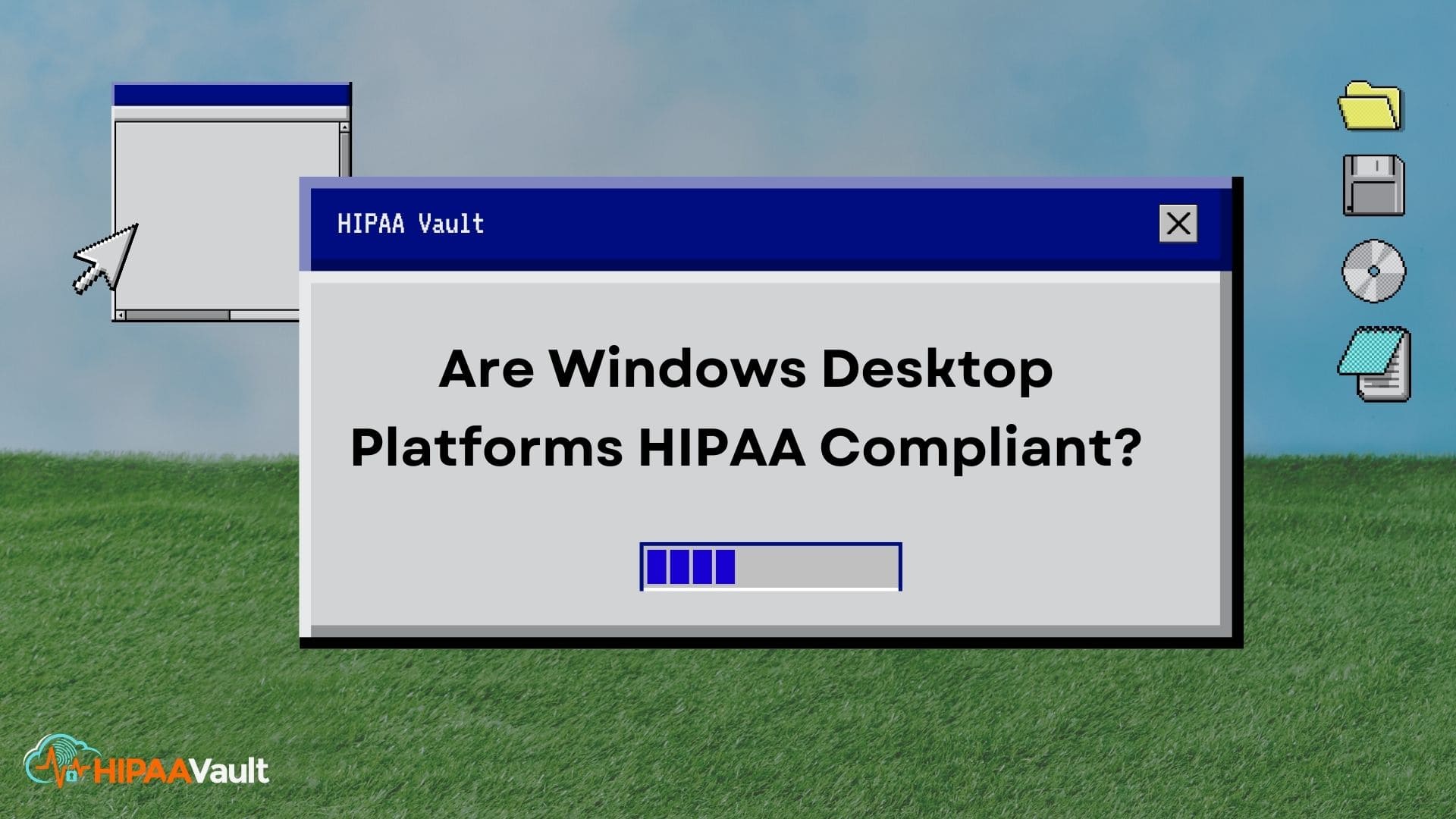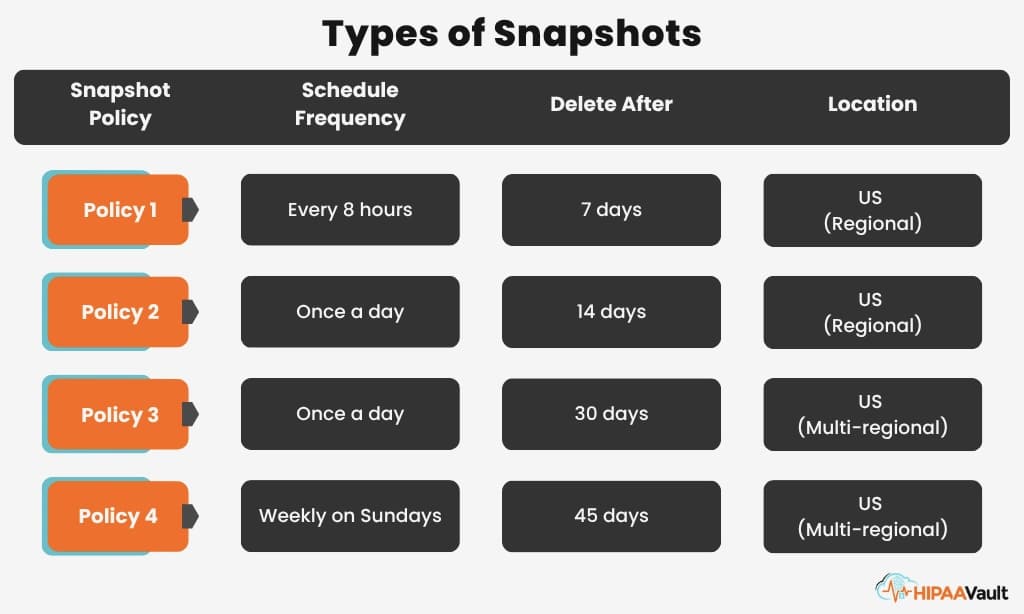Understanding Windows and HIPAA Compliance Basics
When it comes to HIPAA compliance, one of the most common questions among healthcare providers and IT administrators is whether Windows desktop operating systems can be used safely in environments that handle protected health information (PHI).
The short answer? It depends.
HIPAA compliance is not guaranteed by the operating system itself. Instead, compliance depends on how the Windows system is configured, secured, and maintained. With the right safeguards in place, Windows desktops can be HIPAA compliant — but there are many pitfalls to avoid.
In this article, we’ll explore what HIPAA requires, whether Windows 10 and Windows 11 qualify, why older versions are risky, and how you can ensure your desktops are audit-ready.
📢 Need help securing your Windows systems for HIPAA? Contact HIPAA Vault today to schedule a compliance review.
Windows Hosting Secured Against Healthcare Cyber Threats
Protect your proprietary Windows applications with our multi-layered security, antivirus, and ransomware protection.
Learn MoreHIPAA Workstation Requirements: What Windows Desktops Must Include
The HIPAA Security Rule requires all systems that store or access electronic Protected Health Information (ePHI) to follow strict safeguards:
Technical Safeguards
- Access control for authorized users
- Audit logging of all PHI interactions
- Integrity checks to prevent unauthorized changes
- Data encryption in transit and at rest
Physical Safeguards
- Controlled physical access to hardware
- Secure workstation placement
- Media/device disposal policies
Administrative Safeguards
- Regular risk assessments
- Workforce training on workstation use
- Documented incident response procedures
Windows desktops must be configured to support all of these safeguards. An unpatched or misconfigured workstation can easily cause compliance failures.
📢 Looking for secure hosting that meets these requirements? Explore HIPAA-compliant Windows hosting and start secure.
Is Windows 10 HIPAA-Compliant? What You Need to Know
Windows 10 remains common in healthcare settings — but not all versions qualify for compliance.
✅ When Windows 10 can be HIPAA-compliant:
- Running Enterprise, Pro, or LTSC editions
- All security patches applied
- BitLocker encryption enabled
- User access managed with Group Policy or Active Directory
❌ When Windows 10 is not compliant:
- Unsupported editions (like Home)
- Skipped patch cycles
- No encryption or event logging
Microsoft provides HIPAA compliance guidance, but the responsibility for configuration and monitoring rests with your IT team.
If you’re also using Office 365, see our HIPAA Outlook compliance guide for email-specific requirements.
📢 Unsure if your Windows 10 setup meets HIPAA standards? Request a free compliance consult.
Is Windows 11 HIPAA-Compliant? Security Features Explained
Windows 11 introduced significant security enhancements that make compliance easier — if configured properly.
Key HIPAA-Friendly Features:
- TPM 2.0 for hardware-based security
- BitLocker encryption for data at rest
- Windows Hello with multi-factor authentication
- Defender Antivirus with AI-driven threat detection
- Virtualization-Based Security (VBS) for kernel isolation
These align with HIPAA’s technical safeguard requirements. But remember: most features aren’t enabled by default — IT administrators must configure them.
For more, see the HIPAA Journal’s review of Windows 11 and compliance.
📢 Want experts to configure Windows 11 securely? Start with HIPAA Vault’s managed Windows hosting.
Microsoft and HIPAA: What Windows Users Should Understand
Microsoft provides the tools needed for HIPAA compliance, but they do not sign Business Associate Agreements (BAAs) for Windows desktop operating systems.
However, Microsoft does sign BAAs for:
- Microsoft 365 (Outlook, Teams, SharePoint)
- Azure services
If you’re running desktops and Microsoft’s cloud services together, ensure both layers are secured and logged properly. Learn more at Microsoft’s HIPAA & HITECH compliance overview.
📢 Need to align desktops and cloud apps? Schedule a compliance strategy session.
Legacy Windows Versions and HIPAA: Why XP, 7, and 8 Fail Compliance
Older Windows platforms — XP, Vista, 7, and 8.1 — are not HIPAA compliant.
Why they fail:
- No Microsoft support or updates
- Vulnerabilities remain unpatched
- Incompatible with modern security controls
- Audit failures are almost guaranteed
Even if used only for legacy medical devices, HIPAA requires you to document risks and take action to mitigate them — usually by migrating or virtualizing. See HHS.gov’s Security Rule summary.
📢 Still running legacy apps? Ask HIPAA Vault about secure virtualization.
Top Windows Security Features That Support HIPAA Compliance
For HIPAA compliance, these Windows features must be enabled and monitored:
- BitLocker Drive Encryption – secures ePHI at rest
- Windows Defender Antivirus – continuous threat protection
- Windows Hello with MFA – stronger login security
- Group Policy Objects (GPOs) – enforce workstation policies
- Event Logs – track all ePHI-related activity
Each plays a direct role in HIPAA compliance. But compliance also requires regular monitoring and risk assessments.
How Virtual Desktops (VDI) Help Healthcare Stay HIPAA-Compliant
With remote and hybrid healthcare teams, Virtual Desktop Infrastructure (VDI) is increasingly popular for HIPAA compliance.
Benefits of VDI:
- ePHI stays in the data center — not on user devices
- Access sessions encrypted and logged
- Centralized patching and monitoring
- Easy to revoke user access instantly
📢 Ready to implement secure VDI? Let HIPAA Vault design your compliant desktop environment.
Best Practices for Making Windows Workstations HIPAA-Compliant
Follow this checklist for compliant workstations:
- Run only supported Windows editions (Enterprise, Pro, LTSC)
- Apply patches monthly
- Enable BitLocker encryption
- Use antivirus and endpoint protection
- Limit admin rights
- Log and review user activity
- Perform quarterly risk assessments
- Train staff on HIPAA workstation security
- Back up data securely to a HIPAA-compliant cloud
📢 Want experts to handle it for you? Start a managed HIPAA hosting plan.
HIPAA Compliance Mistakes to Avoid with Windows Desktops
These are the most common missteps that lead to violations:
- Running outdated or unsupported Windows versions
- No encryption on laptops or desktops
- Shared login credentials among staff
- Skipping patch cycles
- No audit logs or monitoring
Each creates unnecessary risk — and may lead to fines.
Are Windows Platforms Really HIPAA-Compliant?
Yes — Windows desktops can be HIPAA compliant.
But compliance isn’t automatic. It depends on:
- Choosing the right edition (Pro, Enterprise, or LTSC — not Home)
- Enabling encryption, antivirus, and access controls
- Applying security updates consistently
- Logging and monitoring user activity
- Training staff and documenting risk assessments
If you’re not sure whether your setup passes compliance, it’s time for a proactive review.
📢 Get started today: Explore HIPAA-compliant Windows hosting or request a compliance consultation.








